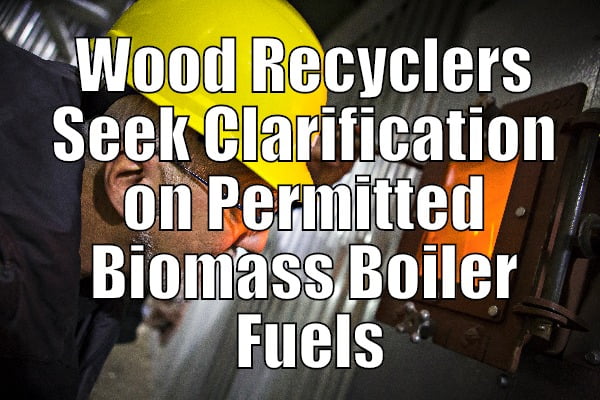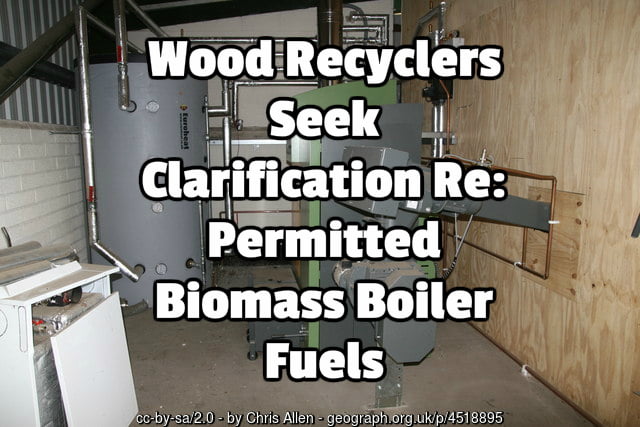A recent development in biomass boiler fuels and the fuels permitted in the UK is that Wood Recyclers are seeking clarification regarding permitted Biomass Boiler Fuels.
Back in 2017 when we first published this article, the Wood Recyclers Association (WRA)) was calling for clarification on exactly what grades of wood are acceptable for small-scale RHI biomass boilers (non-WID compliant), after discovering inconsistencies in guidance to boiler manufacturers and fuel.
Part of an accelerating trend in which society keen on reducing the effects of climate change is turning to biomass for boiler fuels. The last five years have seen a revolution in how governments, people and industry view energy.
The positive aspects of biomass energy have come to the forefront of this discussion, not least the simplicity of using biomass for heating.
The great majority of biomass boilers that are installed use virgin wood.
Waste wood can also be used as fuel if the biomass boiler is intended to run on it; however, extra requirements must be followed when using waste wood as fuel. Either an Environmental Permit or a U4 Exemption permit is required.
Update 2024 – Clarification of Permitted Biomass Boiler Fuels in the UK
The use of biomass boilers in the United Kingdom has been growing as part of the country's efforts to reduce carbon emissions and promote sustainable energy sources. Biomass boilers, which burn organic material to produce heat, are a key component of this strategy. However, there is often confusion regarding which types of fuel are permissible for use in these systems. This article aims to clarify the types of biomass boiler fuels allowed in the UK, with a focus on recycled wood.
Overview of Biomass Boiler Fuels
Biomass boiler fuels are derived from organic materials and are considered a renewable source of energy. The main types of biomass fuels include:
Wood: Logs, chips, and pellets made from wood are the most common forms of biomass fuel.
Agricultural residues: Straw, husks, and other by-products from farming.
Energy crops: Plants grown specifically for energy production, such as willow, miscanthus (elephant grass), and poplar.
Food waste: Organic waste from food production and consumption can also be used as biomass fuel.
Permitted Biomass Fuels in the UK
The UK government regulates the types of fuels that can be used in biomass boilers to ensure they are environmentally friendly and sustainable. The permitted fuels are categorized based on their source and processing requirements.
Wood Fuels
Wood-based fuels are the most common type used in biomass boilers and include:
Logs: Whole logs are permissible if they are sourced sustainably.
Wood chips: Small pieces of wood that are by-products of forestry operations.
Wood pellets: Manufactured from compressed sawdust and wood shavings.
Agricultural Residues
These include materials such as:
- Straw
- Husks
- Nut shells.
Energy Crops
Crops grown specifically for bioenergy production, including:
- Willow
- Miscanthus (elephant grass)
- Poplar.
Food Waste
Permissible food waste includes:
- Organic waste from food processing
- Unused food products (without packaging)
Recycled Wood as Biomass Fuel
Recycled wood can be a valuable fuel for biomass boilers, but its use is subject to strict regulations to ensure it does not harm the environment or human health.
Permissible Recycled Wood
Grade A recycled wood: Clean, uncontaminated wood waste. This includes pallets, clean construction wood, and joinery offcuts.
Grade B recycled wood: Wood that may have been coated with paint or varnish but does not contain halogenated organic compounds or heavy metals.
| Type of Recycled Wood | Description | Permissible Use |
|---|---|---|
| Grade A | Clean, uncontaminated wood waste. | Yes |
| Grade B | Wood with non-hazardous coatings. | Yes, with restrictions |
| Grade C | Wood containing hazardous substances. | No |
Prohibited Recycled Wood
Grade C recycled wood: This includes wood waste that is contaminated with hazardous substances such as heavy metals or asbestos. The use of Grade C recycled wood as biomass fuel is strictly prohibited.
Conclusion
Understanding the types of fuels permitted for use in biomass boilers is crucial for compliance with UK regulations and for the promotion of sustainable energy practices. While wood remains the most common fuel, recycled wood offers a sustainable alternative, provided it meets the necessary standards for use. By adhering to these guidelines, the UK can continue to benefit from the environmental and economic advantages of biomass heating systems.
Why Use Biomass for Our Energy Needs: The Pros
The primary positive aspect of biomass is it is part of the biological cycle of life (biocycle). This means it isn't toxic to the environment because it is more or less the environment. An additional benefit is the fact biomass almost always breaks down relatively quickly to its natural elements. This means a biomass fuel spill would be far less damaging than an oil spill, particularly in the long run.
The burning of biomass does kick out carbon dioxide among other gases. Carbon dioxide, of course, is a greenhouse gas. Proponents of biomass energy/ wood recyclers, however, argue that the gases produced are not really a problem because they are part of the current biocycle. By this, they are arguing that carbon dioxide is a natural element produced in nature and they are correct.

Fossil fuels, on the other hand, are outside of the natural biological cycle in the world because they are buried in the ground, which effectively means they are not part of naturally occurring phases. As we dig and drill fossil fuels out of the ground, we are adding the harmful elements found in them to a system that cannot withstand the massive influx.
We already use many biomass fuels in our daily lives. The first cavemen used them to light fires for warmth, protection and cooking. Today, wood recyclers, and the general public as well, use them to power our automobiles. We are referring to bio-diesel and bio-ethanol.
Whether you realise it or not, these two fuels have been going into our cars at gas stations since 1990 in parts of the US. The reason is they are used as additives in gasoline to cut harmful carbon dioxide emissions. In fact, federal law mandates their use in certain cities such as Los Angeles as well as in most government vehicles.
Carbon dioxide produced from vehicles makes up over a third of all the greenhouse gases produced in many developed countries. Bioethanol made from corn cuts these emissions by over 20 percent compared to your basic gasoline. Biomass fuels can cut emissions by as much as 80 percent. Any way you cut it, Wood Recyclers using biomass fuel, is a step in the right direction.
So what biomass news shows the progress in biomass, over the last few years?
Who Else is Talking About Advances in Biomass Fuel Burning Technology?
Scroll down “budding” Wood Recyclers! Read on below:
It will normally include weighing, unloading, screening, storage, reclaiming and transfer systems and should be designed to ensure reliable, consistent fuel supply to the biomass boiler. Biomass boiler system There are a number of biomass boilers… via Waste equals energy: The biomass equation
However, there is much more to co-firing than simply adding a secondary fuel. Boiler technology and design remain critical issues when evaluating the maximum share of biomass that can be used without compromising boiler performance (output, efficiency … via Toward Carbon-Negative Power Plants
Biomass boilers are taking off in the United Kingdom, as a real alternative to burning fossil fuels to heat homes and businesses.
“Biomass” is anything naturally growing on our planet, which can be burned for fuel. Typically, biomass is any organic … via An Alternative to Burning Fossil Fuels to Heat Your Home Biomass Boilers
 As the energy strategy report notes: Widespread adoption of biomass heating systems could result in states importing wood in the same way that it currently imports fossil fuels, with similar economic results to the extent possible, the state … via Commercial use of wood energy is heating up
As the energy strategy report notes: Widespread adoption of biomass heating systems could result in states importing wood in the same way that it currently imports fossil fuels, with similar economic results to the extent possible, the state … via Commercial use of wood energy is heating up
Energy-efficient commercial and industrial woody biomass boiler systems of various types and sizes are gradually building an excellent track record in schools, hospitals and municipal complexes across the Northeast, mid-Atlantic and Midwest states … via Biomass proving a cost-effective energy solution
[First published in August 2017 as Taxing Plastic Bags Does Not Work.]






Recycling benefits our world. You are making an asset regarding reusing. Do not pay attention to those that exist concerning recycling. Exactly what they are stating regarding recycling is absolutely a lie. However in their little tiny little minds it’s the fact.?
Every Country Every City should use this Technology to Save Planet Earth?
Recycling is good for our planet. You are making a good point about recycling. Don’t listen to those who lie about recycling. What they are saying about recycling is truly a lie. But in their little world it’s the truth.?
Hi you mean 1960 not 1860?
This recycling is very good but why not consider incinerators for the rest that can’t be recycled? Much better than landfills!!
According to everything, the energy produced by biomass fuel systems are effective and do not contribute to global cleth
http://www.pelletech.es/
Great article! It effectively addresses the common confusion about allowable biomass boiler fuels in the UK, especially regarding recycled wood. Very informative.